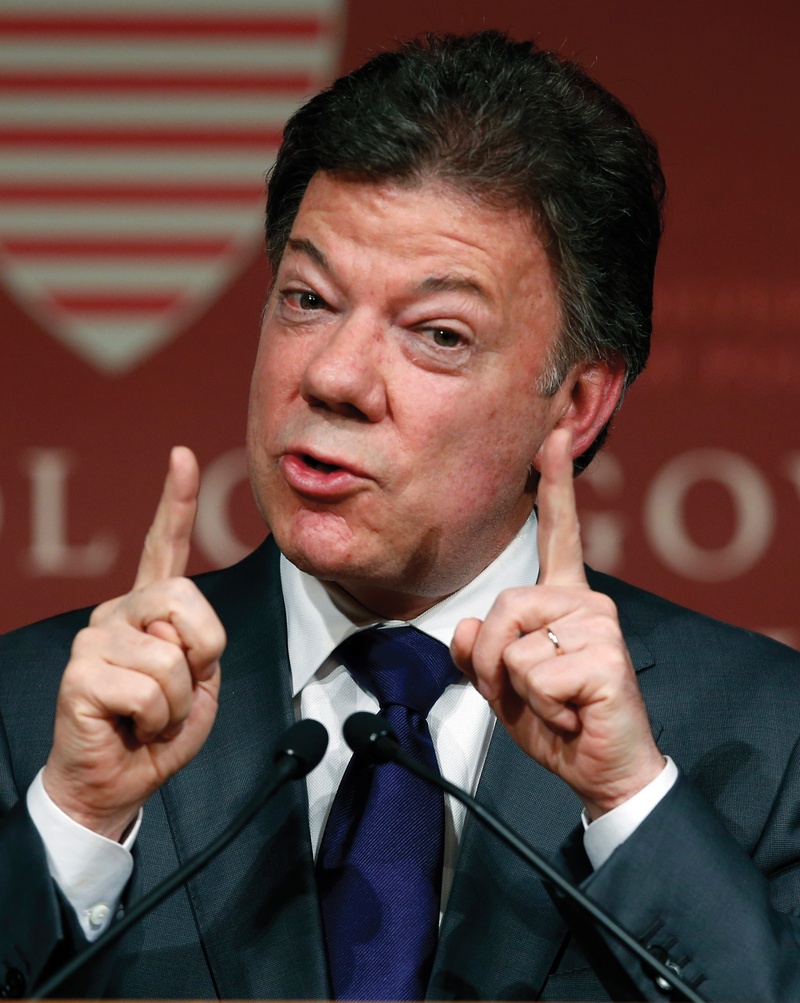Colombian President Juan Manuel Santos outlined his administration’s policy priorities during a public address at the Institute of Politics’ John F. Kennedy Jr. Forum Wednesday.
In his speech before an audience that included both members of his own government and Massachusetts Governor Deval L. Patrick ‘78, Santos named security, modernization, and justice as the primary policy objectives of the past three years of his term.
Just 15 years ago, said Santos, Colombia was on the brink of becoming a failed state, and “Today, we are being [celebrated] as...a working democracy.”
Santos said the courses he took as a student at Harvard Kennedy School, from which he graduated in 1981, have informed his policymaking decisions. Santos has also served as a Nieman Fellow at the University.
To achieve the goal of security, Santos said that he has built upon his predecessor’s policy of “democratic security” that guaranteed safety to all citizens, regardless of status or geography. Santos’s own initiative, he said, was to build on the “rule of law” and the “importance of intelligence” in protecting public safety.
Santos characterized his campaign to modernize the country as a twofold effort, describing the importance of infrastructure improvements, which he called necessary to make the country more competitive, and emphasizing the need to expand broadband Internet access across Colombia.
“When I won the elections, I said to my minister of technology, ‘Why don’t we connect as many municipalities as possible with broadband and fiber optic[s]?’” Santos said.
When his term expires in 2014, he said, every municipality in Colombia will have broadband Internet access.
To harness this capability, Colombia’s government will bring laptops and tablets to remote regions of the country.
According to Santos, when he assumed office in 2010, Colombia was ranked the second-worst country in Latin America for social equality, only ahead of Haiti. In the past three years, however, Colombia has experienced a reduction in poverty of approximately 6.5 percent, placing the nation on par with the average Latin American state.
Still, Santos said, Colombia must work to move past the ongoing half-century war with the Marxist rebel group, The Revolutionary Armed Forces of Colombia, commonly referred to as FARC.
Last year, Santos revealed that the Colombian government was engaging FARC in negotiations on Cuban soil. In the meantime, Santos said he will not seek a ceasefire, saying that FARC rebels might use it as a chance to regain the strategic upper hand the Colombian government has only recently secured.
The state-held advantage is in large part due to aid from the United States government, assistance Santos called the best facet of American foreign policy in decades.
“I am hopeful that we can reach an agreement and that my kids and my grandkids will...enjoy a country of peace,” said Santos, adding that peace is a luxury he himself has never personally enjoyed.
—Staff writer Steven R. Watros can be reached at steven.watros@thecrimson.com. Follow him on Twitter @SteveWatros.
Read more in News
Sackler Building Faces Uncertain FutureRecommended Articles
-
Ninth-Inning Rally Falls Short in Beanpot SemifinalBOSTON--On an overcast day at Yawkey Way, the Harvard baseball team had an afternoon typical of Fenway Park's usual inhabitants--bitterly
-
New Colombian Heads Met at Extension SchoolTwo right-wing politicians were elected president and vice president of Colombia late last month—ten years after they first met each
-
TV Watch: The West WingYes, it’s fall again on “The West Wing,” and you know what that means—election time! With yet another campaign heating
-
HKS Graduate Elected President of ColombiaJuan Manuel Santos, who graduated from Harvard Kennedy School in 1981 and served as a Nieman Fellow at the University, was elected president of Colombia on Sunday and will take office in mid-July.
-
 Colombian President Steps Out of Office and Into HKS Fellowship
Colombian President Steps Out of Office and Into HKS Fellowship














